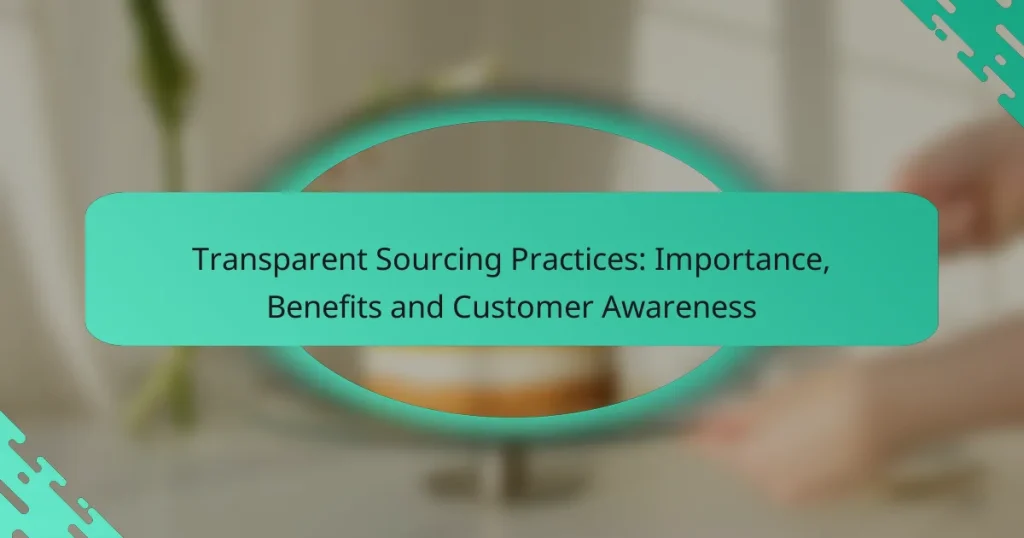Transparent sourcing practices are essential for building trust and loyalty between local businesses and their customers. By openly sharing information about product origins and production methods, companies can demonstrate their commitment to quality and sustainability, which resonates with today’s conscious consumers. This transparency not only empowers consumers to make informed choices but also promotes ethical operations throughout the supply chain.

Why are transparent sourcing practices important for local businesses?
Transparent sourcing practices are crucial for local businesses as they foster trust and loyalty among customers while ensuring ethical operations. By openly sharing sourcing information, businesses can demonstrate their commitment to quality and sustainability, which is increasingly valued by consumers.
Builds customer trust
Transparent sourcing builds customer trust by providing clear information about where products come from and how they are made. When customers know that a business sources materials ethically and sustainably, they are more likely to feel confident in their purchasing decisions.
For example, a local bakery that openly shares details about its organic flour suppliers can attract health-conscious consumers who prioritize quality ingredients. This transparency can lead to repeat business and positive word-of-mouth referrals.
Enhances brand reputation
A strong reputation is vital for local businesses, and transparent sourcing can significantly enhance it. When a business is known for ethical sourcing practices, it can differentiate itself from competitors and attract a loyal customer base.
For instance, a clothing retailer that highlights its commitment to fair labor practices and sustainable materials can appeal to socially conscious shoppers. This positive brand image can lead to increased sales and customer retention.
Meets regulatory requirements
Many regions have regulations that require businesses to disclose sourcing information, especially in industries like food and textiles. Complying with these regulations not only avoids legal penalties but also demonstrates a commitment to ethical practices.
Local businesses should stay informed about relevant laws, such as labeling requirements for food products or environmental standards for manufacturing. By proactively meeting these regulations, businesses can enhance their credibility and avoid potential pitfalls associated with non-compliance.

How do transparent sourcing practices benefit consumers?
Transparent sourcing practices benefit consumers by providing clear information about where products come from and how they are made. This transparency enables consumers to make informed choices that align with their values and preferences.
Informed purchasing decisions
Transparent sourcing allows consumers to understand the origins of products, including the materials used and the labor conditions involved. This knowledge empowers shoppers to choose products that meet their ethical standards, such as fair trade or environmentally friendly options.
For example, a consumer may prefer to buy clothing made from organic cotton sourced from fair labor practices rather than conventional cotton. This informed decision-making can lead to more satisfying purchases and a greater sense of personal responsibility.
Increased product quality
When companies adopt transparent sourcing practices, they often prioritize quality to maintain their reputation. Consumers can expect higher-quality products when they know the sourcing process is ethical and sustainable.
For instance, food products that disclose their sourcing may highlight organic farming practices, leading to fresher and healthier options. This transparency often results in a higher level of trust between consumers and brands, encouraging loyalty.
Support for ethical brands
By choosing products from brands that practice transparent sourcing, consumers actively support ethical business practices. This support can drive change within industries, encouraging more companies to adopt similar transparency measures.
Consumers can identify ethical brands by looking for certifications or labels that indicate responsible sourcing. Engaging with these brands not only benefits individual consumers but also contributes to a broader movement towards sustainability and social responsibility in the marketplace.

What are the key components of transparent sourcing?
Transparent sourcing involves several essential components that ensure clarity and accountability throughout the supply chain. Key elements include clear supply chain visibility, ethical sourcing certifications, and open communication with suppliers, all of which foster trust and informed decision-making for consumers.
Clear supply chain visibility
Clear supply chain visibility means that all stages of the sourcing process are accessible and understandable to stakeholders. This transparency allows businesses to track the origin of materials, monitor production practices, and assess the impact on local communities and environments.
To achieve this, companies can utilize technologies such as blockchain, which provides a secure and immutable record of transactions. Regular audits and reporting can also enhance visibility, helping to identify potential risks and areas for improvement.
Ethical sourcing certifications
Ethical sourcing certifications serve as a benchmark for responsible practices in sourcing. These certifications, such as Fair Trade, Rainforest Alliance, and Global Organic Textile Standard, indicate that products meet specific social and environmental standards.
Companies should consider obtaining these certifications to enhance their credibility and appeal to ethically-minded consumers. It’s important to regularly review and renew certifications to maintain compliance and demonstrate ongoing commitment to ethical practices.
Open communication with suppliers
Open communication with suppliers is crucial for fostering strong relationships and ensuring alignment on sourcing practices. This involves sharing expectations, addressing concerns, and collaborating on improvements throughout the supply chain.
Regular meetings, feedback loops, and transparent reporting can help maintain this communication. Companies should encourage suppliers to voice challenges and suggestions, creating a partnership that enhances overall sourcing transparency and effectiveness.

How can local businesses implement transparent sourcing practices?
Local businesses can implement transparent sourcing practices by establishing clear guidelines for supplier relationships, ensuring that all sourcing decisions are made openly and ethically. This involves regular assessments of suppliers and leveraging technology to enhance visibility throughout the supply chain.
Conduct supplier audits
Conducting supplier audits is essential for maintaining transparency in sourcing practices. These audits should evaluate suppliers on various criteria, including ethical labor practices, environmental impact, and product quality. Regular audits help identify potential risks and ensure compliance with local regulations.
Businesses can schedule audits annually or biannually, depending on the complexity of their supply chain. Engaging third-party auditors can provide an unbiased perspective and enhance credibility with customers.
Utilize technology for tracking
Utilizing technology for tracking sourcing processes can significantly improve transparency. Tools such as supply chain management software and blockchain technology allow businesses to monitor product origins and movement in real-time. This visibility helps in quickly addressing any issues that arise.
Local businesses should consider implementing systems that integrate with existing operations, ensuring that data is easily accessible and actionable. Simple dashboards can provide insights into sourcing practices and supplier performance, aiding decision-making.
Engage with local communities
Engaging with local communities fosters trust and enhances transparency in sourcing practices. Businesses can hold community meetings to discuss sourcing strategies and gather feedback, which can inform better practices. This engagement also helps build a loyal customer base that values ethical sourcing.
Local businesses should consider partnerships with community organizations to promote sustainable sourcing initiatives. By collaborating on projects, they can demonstrate their commitment to ethical practices and strengthen community ties.

What challenges do businesses face in adopting transparent sourcing?
Businesses encounter several challenges when implementing transparent sourcing, including financial constraints, supplier pushback, and a general lack of consumer understanding. These obstacles can hinder the effectiveness and sustainability of sourcing practices.
Cost implications
Adopting transparent sourcing often involves upfront costs, such as investing in technology for tracking supply chains or auditing suppliers. These expenses can be significant, particularly for small to medium-sized enterprises, which may struggle to allocate budget for such initiatives.
Additionally, transparent sourcing may lead to increased operational costs if suppliers demand higher prices for compliance with transparency standards. Companies should weigh these costs against potential long-term benefits, such as improved brand loyalty and reduced risk of supply chain disruptions.
Supplier resistance
Many suppliers may resist transparent sourcing due to concerns about revealing sensitive information or changing established practices. This resistance can stem from fear of losing competitive advantage or the perceived burden of additional compliance requirements.
To mitigate supplier resistance, businesses should engage in open communication and provide clear benefits of transparency, such as access to new markets or enhanced customer trust. Building strong partnerships can also encourage suppliers to embrace transparency as a shared goal.
Lack of consumer awareness
Consumers often lack awareness of the importance of transparent sourcing, which can limit demand for ethically sourced products. Without consumer pressure, businesses may feel less compelled to adopt transparent practices, perpetuating a cycle of opacity in supply chains.
To address this, companies can invest in educational campaigns that inform consumers about the benefits of transparency, such as ethical labor practices and environmental sustainability. By raising awareness, businesses can foster a more informed customer base that values and supports transparent sourcing initiatives.


